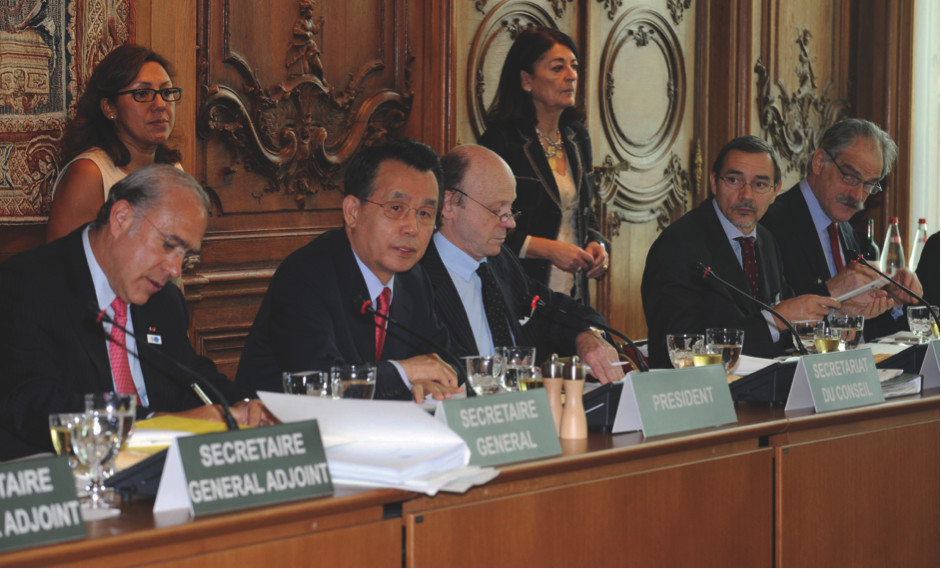Dr. Han Seung-soo has served as Prime Minister of the Republic of Korea (2008-2009), Minister of Foreign Affairs (2001-2002), and Korean Ambassador to the United States (1993-1994) among other roles in politics and diplomacy. He also presided as President of the 56th Session of the United Nations General Assembly in 2001. Since 2013, Dr. Han has been serving as the UN Secretary General’s Special Envoy for Disaster Risk Reduction and Water.
Harvard Political Review: Could you please describe your path from your election to the National Assembly of the Republic of Korea in 1988 to becoming the Korean Ambassador to the United States in 1993? How did your interest in diplomacy and international relations begin?
Han Seung-soo: When I attended Yonsei University, I studied diplomacy in one of the few diplomacy departments in Korea at the time. Afterwards, I stayed in academia as a professor until 1988 when I was elected to the National Assembly. Soon after I was elected, I became Minister of Trade and Industry, and I worked closely with Carla Hills who was the U.S. Trade Representative under President George H. W. Bush at the time. By the end of our negotiations, the relationship between South Korea and the United States had improved greatly. Because of this experience, I had a lot of experience in diplomacy by the time I became Korean Ambassador to the United States.
HPR: Since then, you have also served as the Minister of Foreign Affairs of the Republic of Korea and even the President of the United Nations General Assembly in 2001. How was your experience dealing with the 9/11 terrorist attacks and its aftermath?
HS: I was supposed to be elected President of the United Nations General Assembly on September 11, 2001. I was attending a breakfast prayer meeting when the terrorist attack took place at the World Trade Center, so the election had to be postponed by a day. Soon after I was elected, I was tested in my ability in crisis management. My main actions at the time consisted of rearranging schedules and making sure we had enough resources to address the urgent issue at hand. It was not an easy time, but I somehow managed to get through it.
HPR: What has been your most difficult experience?
HS: Just before I left for the United States as the Korean Ambassador, North Korea declared that they would withdraw from the Non-Proliferation Treaty. This created problems for all the Korean diplomats in Washington at the time. From March 1993 until October 1994 when we finally succeeded on agreeing to a general framework, this was an extremely difficult time for me. I hope to see North Korea abandoning its nuclear program as early as possible to make Korean peninsula a nuclear free zone.
HPR: You were knighted by Queen Elizabeth II in 2004. How did this happen?
HS: During the 1960s and 1970s, most Korean students went to the United States to study abroad. However, somehow I ended up in England where I got my PhD. After that, I taught economics and did research at the University of York and the University of Cambridge. When I returned to South Korea, I worked hard to promote better relations between South Korea and Great Britain. The British government recognized this and eventually awarded me with a knighthood. And to this day, I closely follow what is happening in the royal court in Great Britain. Queen Elizabeth II is the longest serving sovereign in British history and she is very much loved by not only her people but also the Korean people.
HPR: What does your current work at the United Nations entail? When did you first develop an interest in topics such as natural disasters and climate change?
HS: The UN Secretary General chose climate change as one of his most important agenda items. In 2007, he appointed former President of Chile Ricardo Lagos, former Prime Minister of Norway Gro Harlem Brundtland, and me as Special Envoys for Climate Change to help him with this issue. So I suppose originally it was not my choice to become involved in climate change although I have always known the importance of combatting it. Phenomena such as natural disasters and climate change are not problems facing just Korea or just the United States. These are global problems that affect the future of humanity so I am pleased to be involved in tackling such critical issues facing humanity.
Image source: Han Seung-soo
